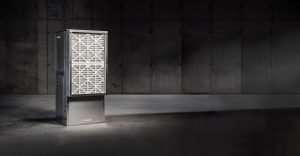Credit: Dandelion
Not familiar with residential geothermal heating? No surprise. Chris Martin in Bloomberg explained that "Residential geothermal heating is uncommon, in part because the expense and effort to dig the wells make them costly to install in existing homes."
Dandelion CEO Kathy Hannun told CNNMoney that "It's a very niche technology that hasn't taken off at all in this country." Her Brooklyn-based company, Dandelion, is out there to make geothermal heating—extracting underground heat to keep homes warm— more affordable for homeowners.
On Wednesday, Dandelion launched the Dandelion Air as a home heating and air conditioning system. Dandelion's claims: it's 4 times more efficient than any furnace on the market and almost twice as efficient as a conventional air conditioning system. So, when you go up to Dandelion's web site there is one sole message and it reads loud and clear. "Geothermal heating and air conditioning so efficient it pays for itself."
How it works: The fuel-free Dandelion Air taps into the ground as a heat source or sink.
So, what kind of affordable cost are we talking about here?
The Dandelion Air is being sold as part of complete Dandelion Home Geothermal System for less than $20,000. The company is also offering no-money-down loans, and payments starting at $135 per month over a 20-year term. How long does the Dandelion home geothermal system last? The lifespan of the Dandelion Air is 20 years, said the company site.
Chris Martin in Bloomberg said the heating and cooling system's cost is "about half the price of typical residential geothermal energy installations available today, according to Chief Technology Officer James Quazi."
The company's website works out the cost as such: $19,423 Net Cost; the upfront cost will be $29,247. Then there is the mention that you receive $8,774 in savings through the 30% federal tax credit and a $1,500 cash discount.
Here is how Adele Peters explained the offering in Fast Company. Peters said that Dandelion Air is a combination heating-and-cooling system that harvests energy from the ground in people's backyards. Like other geothermal heat pumps, it takes advantage of the difference in temperature underground from the outside air–if the ground is warmer than the air, it's possible to move heat from the ground inside to heat the house. In the summer, the system can pump warm air from the house outside and underground.
CNNMoney: "Considering the Dandelion Air homeowner is expected to save about 20% annually on the cost of heating and cooling their home, the startup hopes this is reason enough for homeowners to go geothermal for new or existing homes."
Dandelion was an Alphabet startup, and Kaya Yurieff in CNNMoney wrote about the spinoff's commercial product Dandelion Air, both a heating and air conditioning system. "The systems move heat from the ground into the house in the winter, and heat from the house into the ground in the summer."
"Dandelion Air is a geothermal system that moves heat between the house and the ground using plastic pipes and a pump, bringing heat to the building in winter and pushing heat into the ground in summer," said CNET.
The complete Dandelion Home Geothermal System includes the installation of underground pipes, a buffer tank for hot water, a Nest Learning Thermostat, and a smart monitoring system.
All in all, is this a no-brainer way to keep warm and stay cool? After all, we are looking at clean, inexpensive geothermal heating. No-brainer way? Not in each and every case. CNNMoney wished to note that "geothermal systems may not be a fit for everyone. In states with low electricity costs, a simple AC unit may be cheaper." Jefferson Tester, a professor of sustainable energy systems at Cornell, commented in the report, saying it can also depend on the type of home someone lives in.
The Environmental Protection Agency has said, "Just a few feet below the surface, the Earth maintains a near-constant temperature, in contrast to the summer and winter extremes of the ambient air above ground. Farther below the surface, the temperature increases at an average rate of approximately 1°F for every 70 feet in depth."
More information: dandelionenergy.com/
© 2018 Tech Xplore






















